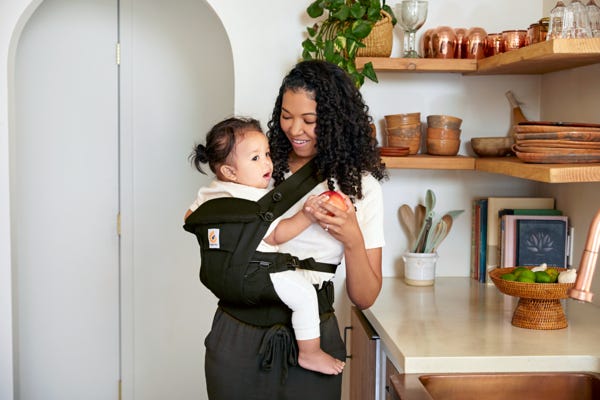I remember as a young adult seeing new moms carrying their babies on their backs. I remember seeing tall slender White women adorned in the latest sling and soft structured carrier fashions, with their young draped across their upper torso, swaying and patting the cloth diapered bottoms of their little ones. Living in Nashville at the time, I didn't see many people who looked like me wearing their babies. I didn't see them in parenting magazines or even on the product boxes of my favorite carriers. And although I knew that like many things that the western world adapted from indigenous cultures, it felt that babywearing and the representation thereof had been vanquished into the unknown and unrecognizable. The way that it seemed was that babywearing was not meant for ME, but instead moms with fairer skin.
It wasn't until years later, that I began to do more research, regarding the origins of babywearing, Black women and breastfeeding, and overall attachment parenting and how African tribes and indigenous cultures have been practicing these sorts of things forever. Ever heard of the phrase, "we ain't new to this?"
In African cultures, women would wrap a long piece of non-stretch fabric around their bodies, as their little one lay asleep on their back. They would tie and tuck the loose ends underneath their breast and proceed upon their day, babe in tow. Women of the village would congregate, walking along with the soil, all while being hands-free. They breastfed their children. They laughed. They cultivated a home.
So when did babywearing make its way West? Babywearing made its way to the U.S. in the 1970s.
Doula, Kaytee Crawford explains it best, "Carriers like these with buckles and straps, they all had to come from somewhere, right? Well, back in the 70s someone went to Africa and saw how they were carrying their babies with pieces of fabric and came back to the U.S. and decided to make a carrier with buckles and straps to mimic the way Africans were carrying their babies." And just like that, babywearing took off. And like many things adapted within the popular culture, the roots are erased.
So how can we celebrate Black History Month while babywearing?
We acknowledge the deep rich roots that have been erased. We acknowledge the history of where our favorite Ergobaby Carrier and so many other carriers have come from... We acknowledge that THIS is not a new idea. Attachment parenting is not a new idea. It has been here and adopted, and oftentimes whitewashed.
We push for representation. As a new mother in 2006, I didn't see many Black mothers wearing their babes. I didn't see it in my day to day, and I most certainly didn't see it in mainstream media. And why? It wasn't because Black moms weren't babywearing. It was because it wasn't being represented as the norm and because it was being represented, I metabolized it as perhaps that this babywearing thing wasn't for me. Representation matters.
We open doors. Finding and supporting your local Black Babywearing Group is necessary to this work. I'll never forget going to one of my first Mama Groups here in Los Angeles. I was surrounded by Black and Brown mothers, helping each other breastfeed, babywear, etc. We cried together. We laughed together. It felt ancestral and similar perhaps to what the African women I described at the beginning of this piece experienced. It felt communal. It felt like home. Being in the space and in the community allowed me to feel seen and heard, outside of a world that so often doesn't see or hear Black mothers, let alone Black women. By supporting groups like these, we open doors and pathways to a more represented future.
Happy Black History Month.


